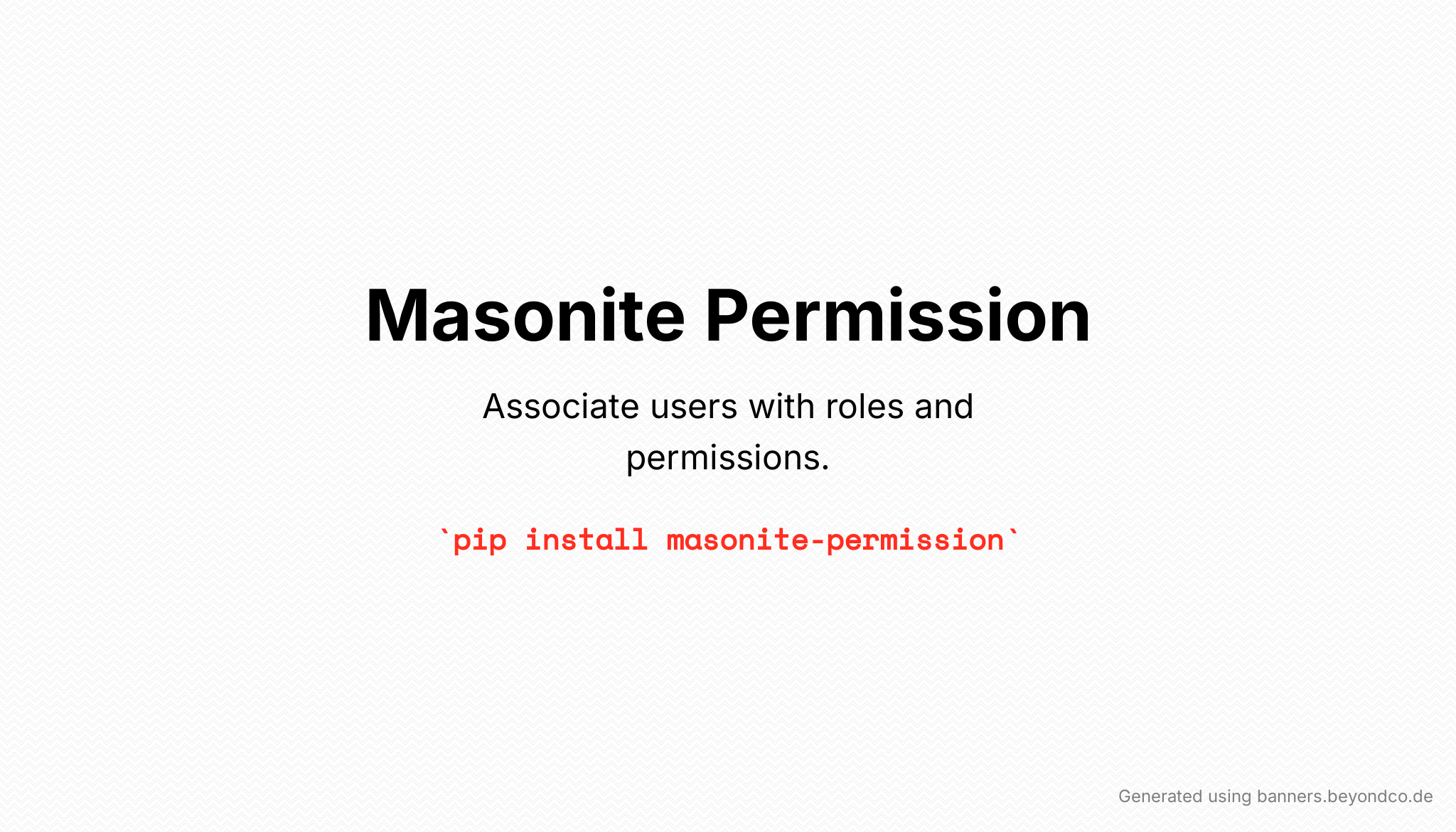- Published on
Masonite Permission
- Authors

- Name
- Yubaraj Shrestha
- @meyubaraj

Introduction
Associate users with roles and permissions to control access to your application.
Getting Started
Install the package using pip:
pip install masonite-permission
Add PermissionProvider to your project in config/providers.py:
# config/providers.py
# ...
from masonite_permission import PermissionProvider
# ...
PROVIDERS = [
# ...
# Third Party Providers
PermissionProvider,
# ...
]
Publish the package configuration files.
python craft package:publish masonite-permission
This will add migrations and other masonite-permission related configuration to your project. Run your migrations to create the related database tables.
python craft migrate
Now, extend User model class with HasRoles mixin.
from masoniteorm.models import Model
from masoniteorm.scopes import SoftDeletesMixin
from masonite.authentication import Authenticates
from src.masonite_permission.mixins import (HasPermissions, HasRoles)
class User(Model, SoftDeletesMixin, Authenticates, HasRoles, HasPermissions):
"""User Model."""
__fillable__ = ["name", "email", "password"]
__hidden__ = ["password"]
__auth__ = "email"
Usage
Working with Role
Creating Roles
""" Creating Role
Arguments:
name: The name of the role
slug: The slug of the role, must be unique
"""
from masonite_permission.models import Role
role = Role.create({
"name": "Admin",
"slug": "admin"
})
Add permissions into roles
""" Add permissions into roles
Available Methods:
1. sync_permissions: Syncs the permissions with the role
arguments: Takes a list/tuple of permission slugs
2. attach_permission: Adds a permission to a role
arguments: Takes permission model object or permission slug
3. detach_permission: Removes a permission from the role
arguments: Takes permission model object or permission slug
"""
""" Syncing permissions with role, adds provided permissions and removes all other permissions
Arguments:
permissions: Takes a list/tuple of permission slugs
"""
role.sync_permissions(["create-post", "read-post", "update-post", "delete-post"])
# or
role.sync_permissions("create-post", "read-post", "update-post", "delete-post")
# or
role.sync_permissions([]) # clears all permissions from role
""" Attach permission, this will add new permission into role if already not added
Arguments:
permission: Takes permission model object or permission slug
"""
role.attach_permission("create-post")
# or
role.attach_permission(Permission.first())
""" Detach permission, this will remove permission from role if already added
Arguments:
permission: Takes permission model object or permission slug
"""
role.detach_permission("create-post")
# or
role.detach_permission(Permission.first())
Working with Permission
Creating Permission
""" Creating Permission
Arguments:
name: The name of the permission
slug: The slug of the permission, must be unique
"""
from masonite_permission.models import Permission
permission = Permission.create({
"name": "Create Post",
"slug": "create-post" # must be unique
})
Add permissions into roles
""" Add permissions into roles
Available Methods:
1. sync_roles: Syncs the roles with the permission
arguments: Takes a list/tuple of role slugs
2. attach_role: Adds a permission to a role
arguments: Takes role model object or role slug
3. detach_role: Removes a permission from a role
arguments: Takes role model object or role slug
"""
""" Syncing permissions with role, adds provided roles and removes all other roles
Arguments:
roles: Takes a list of role ids or role collection
"""
permission.sync_roles(['admin', 'editor'])
# or
permission.sync_roles('admin', 'editor')
# or
permission.sync_roles([]) # clears all role from permission
""" Attach role, this will add new permission into role if already not added
Arguments:
role: Takes role model object or role slug
"""
role = Role.first()
permission.attach_role(role)
# or
permission.attach_role('admin')
""" Detach role, this will remove permission from role if already added
Arguments:
role: Takes role model object or role id
"""
role = Role.first()
permission.detach_role(role)
# or
permission.detach_role('admin')
Working with User
user = User.first()
Adding/Removing single role
# Add/Remove single role
role = Role.first()
user.assign_role(role) # or you can pass role id
user.revoke_role(role) # or you can pass role id
Adding/Removing multiple roles
# add/remove multiple roles
roles = Role.all()
user.sync_roles(roles) # or you can also pass list of ids...
user.sync_roles([]) # clears all roles from user
Checking if user has roles
# check if user has role
user.has_role_of("admin") # returns boolean
# check if user has any of the roles
user.has_any_role(["admin", "editor"]) # returns boolean
# or
user.has_any_role("admin", "editor")
# check if user has all of the roles
user.has_all_roles(["admin", "editor"]) # returns boolean
# or
user.has_all_roles("admin", "editor")
Adding/Removing single direct permission
# Add/Remove single permission
user.give_permission_to("read-post", "edit-post") # this can be a tuple or a list
# or
user.give_permission_to(["read-post", "edit-post"])
user.revoke_permission_to("read-post", "edit-post") # this can be a tuple or a list
# or
user.revoke_permission_to(["read-post", "edit-post"])
Adding/Removing multiple direct permissions
# add/remove multiple direct permissions
permissions = Permission.all().pluck("slug")
user.sync_permissions(permissions) # tuples or list of permission slug
user.sync_permissions([]) # clears all permissions from user
Checking if user has permissions
# check if user has permission (for single permission)
user.has_permission_to("read-post") # returns boolean
# check if user has any of the permissions
user.has_any_permission(["read-post", "edit-post"]) # returns boolean
# or
user.has_any_permission("read-post", "edit-post")
# check if user has all of the permissions
user.has_all_permissions(["read-post", "edit-post"]) # returns boolean
# or
user.has_all_permissions("read-post", "edit-post") # returns boolean
Using in Template
In case of Roles Checking if user has role.
{% if user.is_("admin") %}
<p>You are an admin</p>
{% endif %}
Checking if user has any of the roles
{% if user.is_("admin|editor|truck-driver") %}
<p>You can be either admin, editor, truck driver or all of those</p>
{% endif %}
Checking if user has all of the roles
{% if user.is_("admin,editor,truck-driver") %}
<p>You are an admin, editor and also truck-driver</p>
{% endif %}
In case of Permissions Checking if user can do {permission}.
{% if user.can_("edit-post") %}
<p>You can edit post</p>
{% endif %}
Checking if user can do any one or more of the {permissions}
{% if user.can_("edit-post|delete-post") %}
<p>You can either edit-post, delete-post or both.</p>
{% endif %}
Checking if user can do all of the {permissions}
{% if user.can_("edit-post,delete-post") %}
<p>You can edit post and also delete post.</p>
{% endif %}